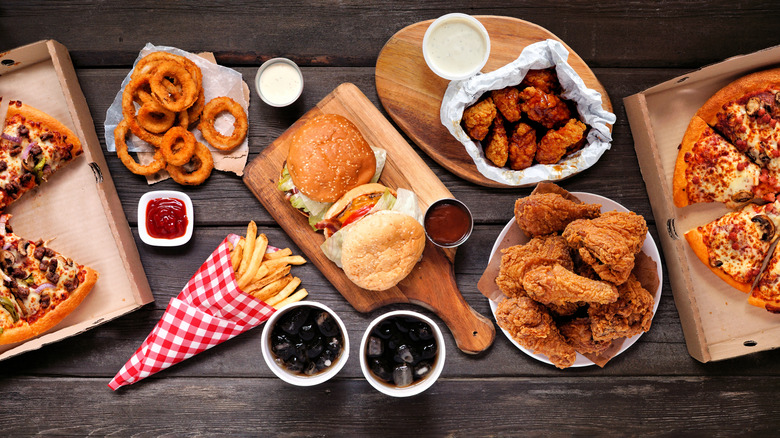Here's What To Eat If You Ate Too Much
Picture this: You're laying down with the sting of heartburn, a sensation of being bloated, and you're struggling to keep your eyes open. It could happen after a particularly big meal, one of those types of dinners where the food seems too delicious to stop eating, or maybe you got caught up in binging both your favorite show and your favorite snacks. Perhaps it's a bad reaction to those appetizers or maybe it's the third helping of pasta that did you in but, whatever the case may be, those sensations of grogginess and heaviness are, according to EatingWell, the outcome of overeating.
You may associate overeating certain foods such as turkey with feeling fatigued after dinner, and you could be used to popping some antacids to deal with some minor acid reflux, but if you find yourself overindulging more often than not you could be at risk for severe health problems. Healthline warns that the long-term effects of overeating can lead to a rise in body fat, an increased risk of developing diseases such as Diabetes type 2, the disruption of one's sleep cycle, and even mental decline.
Overdoing it occasionally, however, shouldn't be cause for concern, but what happens when you do overeat? Is there anything you can do to help relieve those symptoms instead of just waiting for them to pass?
Try these foods after a heavy meal to help soothe symptoms
Although a swig of Mylanta might be your go-to for dealing with heartburn, EatingWell offers a few suggestions on what you should eat and drink when suffering the outcomes of an overly-excessive meal.
If you're still feeling hungry for something sweet following a heavy meal, it's recommended to turn away from those sugary desserts and choose certain antioxidant-rich fruits such as cherries, kiwis, grapes, and berries. The antioxidants in the fruit will help your body recover from "free radicals," which are molecules naturally produced by the body after a large meal that can cause damage if built-up (via National Library of Medicine). In fact, you could also pair the fruit with a glass of red wine, another antioxidant-rich choice, provided you don't overdo it with the wine, of course.
While fruit and wine are a great after-dinner option, EatingWell reports that adding vinegar and spices to your meals can assist you as well. A spoonful of vinegar can help lower one's blood sugar and certain spices such as rosemary, cinnamon, cloves, and black pepper can help slow the process of fat absorption and give you some more of those antioxidants.
MedicineNet also offers a few simple solutions to recovering from overeating, such as taking a walk, drinking water at regular intervals, and most importantly, relax and acknowledge that you may have binged too much.

